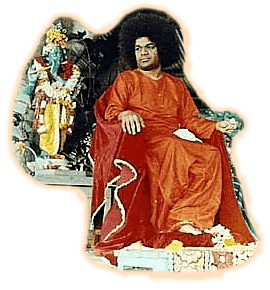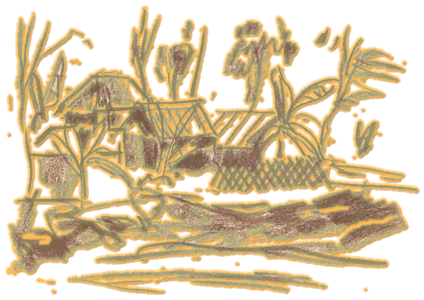|
Other Baba-books
|
||||||||
 |
The original
Sanskrit verses and with comments taken from the writings of
|
|||||||
|
'The one who
gives up on the regulations of the scriptures will be acting according
his own whims 1 2a 2b 3 4 5 6 7 8 9 10 11 12 13 14 15 16 17 18a 18b
When
you
accept
the five elements, you have to agree to the fivefold
proliferation of each element, making in all twenty-five tattvas
(truth, essence, principle) of principles. Only four elements, earth,
water, fire and air, are evident and perceptible; but ether or sky
is the basis for all. So too, manas (feeling, mind), buddhi
(intellect), chittam (consciousness, knowledge,
awareness) , ahamkāra (ego, self-love, selfish individuality)
are all four cognized by experience; but the anthah-kārana, which is their base, can only
be inferred. All things of which we are aware are but manifestations of
a Thing, of which we are unaware. They derive their strength
and support from the unseen. That unseen basis of which you are unaware
is I Myself, the ātmā. All are based on Me. That
which is based is subject to change: growth, decline and modification.
But the base or ādhāra (basis) should not therefore be taken as
subject to change. For example, consider the moon and its reflection in
water. The image of the moon in the water is not steady; it shakes and
quivers. It is the water that shakes and quivers, not the moon above.
Ignorant people, who are like children, infer that the moon is itself
shaking. The transference of the characteristics of the ādheya
(being based, contained, sustained) to the ādhāra is the
fundamental asuric (demonic) quality. The recognition of the
eternality and truth of the ādhara even in the ādheya -
that is the real daivi sampath (divine wealth, nature,
qualities), God-directed nature. Arjuna
listened
intently
and with steady attention to all this. Then he
queried: "Mādhava! You said that it is the inherent quality of nature that
distinguishes these two. Which qualities make for āsuric and
which for daivi natures? Please clarify." - Gītā Vahini, p. 213 śrī-bhagavān uvāca ahimsā satyam akrodhas tejah kshamā dhritih śaucam [to
verse
2]
(10) nonviolence (11) integrity (12) equanimity,
absence
of anger or resentment (13) detachment (14) inner peace (15) refraining
from scandal-mongering and talking ill of others (16) sympathy (17)
absence of greed (18) sweetness and softness of speech (19) fear of adharmic
acts (20) absence of fluctuation in the mind. [to
verse
3]
(21) courage during disaster, patience and fortitude
(22)
steadiness (23) cleanliness (24) harmlessness (25) humility. These
twenty-five holy qualities are the traits of daivi sampath, the
divine endowment." -
Gītā
Vahini,
pp. 214-5 dambho darpo
'bhimānaś ca 'Pride,
pomp,
vanity,
anger, harshness and absence of discrimination are the
components of the āsuric endowment of man. Persons having these
qualities are infused with the āsuric character. Though for all
outward appearance they may be humans, they do not deserve that name.
Those who have the aforesaid qualities are known as men with divine
parts; those who have the āsuric attributes are known as dānva-mānavas,
demonic
humans.'
-
Gītā Vahini, p. 215 daivī
sampad vimokshāya The
forces
of
good (devas) are combating with the forces of evil (āsuras)
in
every
living being and if they rely on mahā-sakti, the great
divine force that fosters and fends the universe, they can easily win
and reach the goal.
-
Sathya Sai Speaks V, p. 232 dvau
bhūta-sargau loke 'smin` pravrittim
ca nivrittim ca asatyam
apratishthham te etām
drishthim avashthabhya kāmam
āśritya dushpūram The
six
enemies
of man are eating into his vitals, embedded in his own
inner consciousness. They are the demons to be killed. They are lust (kāma)
anger
(krodha) greed (lobha) attachment (moha)
pride (mada) and malice (matsarya). They reduce man to
the level of a demon. They have to be overpowered and transmuted, by
the supreme alchemy of the divine urge. - Sathya Sai Speaks VII, p. 103 cintām
aparimeyām ca` āśā-pāśa-śatair
baddhāh idam adya
mayā labdham asau mayā
hatah śatrur ādhyo
'bhijanavān asmi [to
verse
15] As a result of wealth, man is changing into a demon.
Possession of money makes one very proud. When one has wealth, he is
not inclined to follow the righteous path. He will also lose his
capacity to distinguish the right from wrong. This has been described
by poet Vemana by saying that if your wealth increases, then you will be
arrogant, and when your arrogance increases, your bad feelings will
increase. -
Summer Showers in Brindavan 1973, pp. 156 aneka-citta-vibhrāntā Those who
are immersed in selfishness, egotism, greed, vice, violence and
unrighteousness will suffer from evil urges in their last days and
destroy themselves ... achieving only hell, Naraka. - Bhagavatha Vahini, chapter 44 (p. 331). ātma-sambhāvitāh
stabdhā But
without
deep
inquiry, without discriminating between the real and the
unreal, if one mistakes the seen alone to be lasting, and argues so, he
is losing his way. How can he reach the goal? How can he attain the
reality? The yearning to know this reality comes of daivi sampathi,
God-ward
attributes.
The āsuri sampathi is the opposite
tendency, which makes a man argue that he has known when he has not,
which keeps him away from all attempts to know, which induces him to
establish untruth as truth. - Gītā Vahini, p. 212 ahankāram
balam darpam Daiva-thwam
and danava-thwam (divinity and demonic) compete
for the possession of the mind of man and pursue him as light and
darkness. Danava-thwam piles upon man misery after misery, while
daiva-thwam warns him against yielding to despair
on that account. They have to be welcomed as beneficial, for misery is
the crucible in which the dross is removed and the pure gold separated
from the alloys. The danava forces are aflame in every person
as lust and greed, as hate and envy, as pride and pompousness. - Sathya Sai Speaks V, p. 104 tān aham
dvishatah krūrān āsurīm
yonim āpannā tri-vidham
narakasyedam Three
qualities
form
the fundamental basis of all āsuric natures.
They are kāma, krodha and lobha (lust, anger and
greed). They destroy the self and foster the demon in man. They have to
be overwhelmed and overcome by the divine qualities of vairāgyam,
santham and thyagam, detachment, equanimity
and renunciation. They are the warriors to rely on in this fight.
Foster these warriors and they will, in a trice, wipe out the forces of
demonic influence. Any trace of the foes, kāma, krodha and lobha,
left unsuppressed anywhere is a potential danger; so they must be
reduced to ashes. That leads to real success in the struggle for the
goal. - Gītā
Vahini, p. 216 etair
vimuktah kaunteya With
the
doors
of your hearts closed by the bolt of falsehood, how can you
lay the blame on God, if He does not illumine it with the rays of His
Grace? Falsehood is prompted by desire, by kāma; when kāma
is in the heart, Rāma (God) has no room. Let kāma and
his evil brood of krodha, lobha, moha, mada and matsarya
(anger, greed, attachment, pride and hate) slither out of the heart;
then only can Rāma install himself there. - Sathya Sai Speaks VI, p. 27 yah
śāstra-vidhim utsrijya If
each
one
follows his own nose, there will be chaos. If each one decides
to pursue his own wish (or even his own reason, for after all, reason
may be used to justify one's own predilections and pet prejudices), man
will descend to the level of the apes or worse. So, man has to be
guided by the wisdom of the past, the bounds prescribed by his
well-wishers, the sages, the śāstras or moral codes laid down
to map the conscience in him. The śāstras only channelize the
urges that arise within men. Like the seed that can sprout into a
plant, only from under the soil, all the various emotions, feelings,
and impulses sprout only from within the mind of man. If the mind is
steady, nothing can shake you into indecision or indifference. - Sathya Sai Speaks VI, p.
109 tasmāc chāstram pramānam te Kārana:
the
original cause, the remote, the underlying cause, the cause of
everything, causality to the logic of divinity .
|
||||||||





